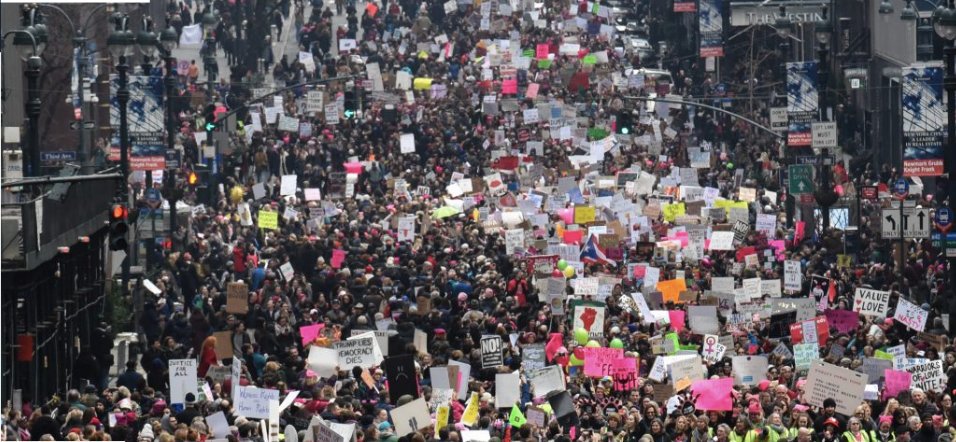Human Rights Committee completes first reading of the Draft General Comment on the Right of Peaceful Assembly
Published on 06 Nov 2019, 10:50 AM
The HR Committee continued and concluded the first reading of the draft General Comment during its 127th session in October and November 2019
 Women's March on 42nd St. in New York City on 21 January 2017. Photo credit: time.com
Women's March on 42nd St. in New York City on 21 January 2017. Photo credit: time.com
During its 127th session, the Human Rights Committee continued and concluded the first reading of the Draft General Comment on Article 21 of the ICCPR – the Right to Peaceful Assembly. The public discussions took place on 18, 22, 25, 29, 30 October, 4 and 8 November.
"I support that it is important to lay down the context of our position [regarding notification systems]. We are opposed to authorization, notification is the way to go. But even our support of notification is somewhat conditional. What system of notification is in place?"
- Yuval Shany, vice-Chair of the Human Rights Committee
General discussions
To start, the Committee dealt with some recurring vocabulary issues. It was decided to stay as close as possible to “Covenant-language”: restriction will be used instead of limitation, and the positive obligation of States is to respect and ensure the right to peaceful assembly, not to accommodate.
Throughout the discussions, many remarks were made on the fact that the French and Spanish version of the draft General Comment does not correspond to the English version. The Rapporteur ensured the members of the Committee that all official versions would be compared and analysed to ensure that they share the same message.
Specific issues
The Committee decided how it was going to deal with article 20 ICCPR, the article that prohibits incitement to hatred, discrimination, hostility or violence. Assemblies that incite to hatred, are not protected by the ICCPR. Some members saw article 20 as part of the scope of article 21, while others saw it as a restriction to the exercise of the right to peaceful assembly.
Furthermore, the Committee cautioned against the too early resort to public order as a reason to stop assemblies from happening. Assemblies inherently cause some disruption, and States have to deal with a minimum of that. Public order should not be used to unduly restrict the holding of peaceful assemblies.
The Committee continued by discussing the exhaustive list of legitimate purposes for which the right to peaceful assembly may be restricted. They are mentioned explicitly in article 21: interests of national security or public safety, public order (ordre public), the protection of health or morals or the protection of the rights and freedoms of others. Moreover, any restriction must be provided by law, necessary and proportionate.
A difficult discussion took place about face coverings during assemblies. The Rapporteur explained that the idea of this paragraph was to admit that face coverings pose challenges to States, but a general ban on face coverings is not compliant with the ICCPR. Some members, however, disagreed and found that covering your face during an assembly makes the assembly automatically violent and no longer peaceful, as it is a sign of hostility, in particular in political assemblies. Other members found that this paragraph was crucial for three reasons. Firstly, the face coverings can be part of the expressive purpose of the assembly, as is the case for Halloween or Carnival for example. And secondly, the face covering can have a protective purpose since the mere fact of protesting against state institutions or policies puts participants at risk. They should be able to express themselves as a group without being identified individually. Thirdly, a mask can be worn for health reasons, in heavily polluted cities for example. In these cases, face coverings do not render the assembly automatically violent. The Rapporteur stressed that a general ban on face coverings is not compliant with the Covenant, but that coverings should not be used by participants to escape responsibility for violence.
Another point of discussion was notification, that is seen as a special kind of restriction. The Committee clarified it prefers notification systems over the more strict authorisation system, but even its support of the notification system is somewhat conditional. Both systems can be abused by authorities to stifle peaceful assemblies and this should be avoided by ensuring that the requirements are proportionate and not unduly burdensome.
Next steps
All stakeholders, including Member States, UN and regional human rights mechanisms, UN organisations or specialised agencies, national human rights institutions, civil society, and academia are invited to provide their comments on the new draft in writing to ccpr@ohchr.org.
Submissions should:
- be submitted in English, French or Spanish; and
- be submitted in WORD format (no hard copies).
Deadline:
Comments must be submitted by 14 February 2020.
The revised draft General Comment No. 37 is available here.
 Women's March on 42nd St. in New York City on 21 January 2017. Photo credit: time.com
Women's March on 42nd St. in New York City on 21 January 2017. Photo credit: time.com

